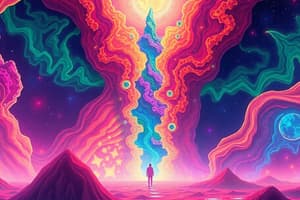Podcast
Questions and Answers
Hallucinogens do not cause addiction, but a person can be addicted to the effects of hallucinogens.
Hallucinogens do not cause addiction, but a person can be addicted to the effects of hallucinogens.
True (A)
Ketamine and PCP are examples of stimulants.
Ketamine and PCP are examples of stimulants.
False (B)
Psychedelic hallucinogens enhance the brain's selection process to help filter surroundings better.
Psychedelic hallucinogens enhance the brain's selection process to help filter surroundings better.
False (B)
LSD was first synthesized by Albert Hofmann in 1938.
LSD was first synthesized by Albert Hofmann in 1938.
Natural compounds like psilocybin and mescaline are derived from certain plants and fruits.
Natural compounds like psilocybin and mescaline are derived from certain plants and fruits.
Entactogens are known to evoke feelings of emotional openness and relatedness.
Entactogens are known to evoke feelings of emotional openness and relatedness.
Hallucinogens have been utilized by ancient ancestors mainly for recreational purposes.
Hallucinogens have been utilized by ancient ancestors mainly for recreational purposes.
Hallucinogens can be consumed in various forms, including pills, drinks, and injections.
Hallucinogens can be consumed in various forms, including pills, drinks, and injections.
Flashcards
What are Hallucinogens?
What are Hallucinogens?
Hallucinogens, also known as psychedelic drugs, are substances that drastically alter a person's perception of reality, including their senses, thoughts, and feelings. These effects can range from heightened sensory experiences to vivid hallucinations.
What are the main types of Hallucinogens?
What are the main types of Hallucinogens?
Hallucinogens can be categorized into four main subclasses: Psychedelics, Entactogens, Dissociatives, and Atypical. Each subclass has unique effects on perception and consciousness.
What is the effect of Psychedelics?
What is the effect of Psychedelics?
Psychedelic hallucinogens disrupt the brain's normal filtering process, making users experience everything in their surroundings intensely. This can lead to sensory overload, where colors, sounds, and textures become overwhelming and distinct.
What are the main examples of Psychedelics?
What are the main examples of Psychedelics?
Signup and view all the flashcards
What are the effects of Entactogens?
What are the effects of Entactogens?
Signup and view all the flashcards
What are the examples of Entactogens?
What are the examples of Entactogens?
Signup and view all the flashcards
How do Hallucinogens affect the brain?
How do Hallucinogens affect the brain?
Signup and view all the flashcards
Why are some people addicted to the effects of Hallucinogens?
Why are some people addicted to the effects of Hallucinogens?
Signup and view all the flashcards
Study Notes
Hallucinogens
- Hallucinogens, also known as psychedelic drugs, alter perceptions of sight, sound, thoughts, and feelings.
- They cause wild imaginations, hallucinations, and visual distortions.
- Hallucinogens do not cause addiction, but people can become addicted to their effects.
- Hallucinogens have been used for medicinal and religious purposes for a long time.
- Examples include LSD, Ketamine, PCP, Marijuana, mescaline (from peyote cactus), psilocybin (from certain mushrooms), and anticholinergics (from jimson weed).
- LSD was first synthesized in 1938.
Types of Psychoactive Drugs
- Hallucinogens
- Stimulants
- Depressants
- Opiates & Opioids
Lecture Objectives
- Define hallucinogens and give examples.
- Explain different classes of hallucinogens.
- Explain the physiological effects of hallucinogens.
How Hallucinogens are Taken
- Swallowed (pills, drinks)
- Smoked
- Applied to the tongue (e.g., blotter acid)
- Injection (intravenous or intramuscular)
Subclasses of Hallucinogens
- Psychedelics
- Entactogens
- Dissociatives
- Atypical
Psychedelics
- Under normal conditions, the brain selects how a person perceives their surroundings.
- Psychedelic hallucinogens remove this selection process.
- Users experience an overwhelming sense of expansion with exaggerated colors, sounds, smells, and textures.
- Common experiences include seeing visions and hearing voices.
- Examples include LSD, Psilocybin, Mescaline, DMT (ayahuasca).
Entactogens
- Produce experiences of emotional communion, oneness, relatedness, emotional openness (e.g., empathy).
- May have therapeutic benefits for post-traumatic stress disorder and anxiety.
- Example: MDMA
Dissociatives
- The brain's ability to translate sensory perceptions allows a person to experience their surroundings.
- Dissociative hallucinogens create a state of sensory deprivation, allowing the mind to create its internal environment.
- Dissociative effects often produce an "out-of-body" experience, leaving users in a trance-like state.
- Examples include Ketamine, DXM, and Nitrous Oxide.
Atypical Hallucinogens
- A diverse group of unrelated substances with various mechanisms of action, legal status, and therapeutic potentials.
- Some act as serotonin agonists, antagonists, or NMDA antagonists.
- Examples include Ibogaine, Salvinorin A, and THC.
Harmful Effects
- Physical: Flashbacks, increased energy/heart rate, nausea
- Emotional: Mood swings, panic attacks, loss of senses, depression
Mixing Hallucinogens With Other Drugs
- Mixing hallucinogens with stimulants can cause extreme stress to the body.
- Mixing hallucinogens with alcohol can further impair coordination and increase the chance of vomiting.
Studying That Suits You
Use AI to generate personalized quizzes and flashcards to suit your learning preferences.



